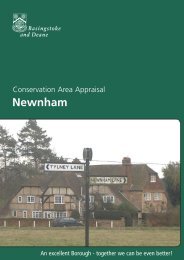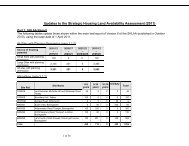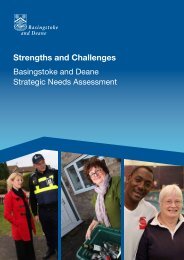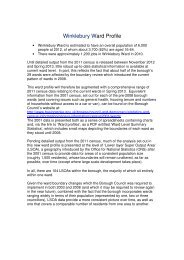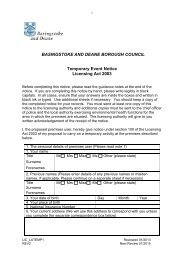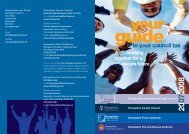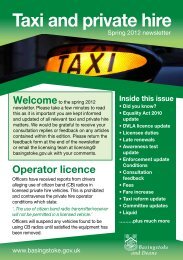Body Piercing Advice and Safe Practice - Charnwood Borough ...
Body Piercing Advice and Safe Practice - Charnwood Borough ...
Body Piercing Advice and Safe Practice - Charnwood Borough ...
You also want an ePaper? Increase the reach of your titles
YUMPU automatically turns print PDFs into web optimized ePapers that Google loves.
<strong>Body</strong> piercing<br />
aftercare advice sheet (a)<br />
Sample pages<br />
Premises Name:<br />
Premises Address:<br />
Telephone No:<br />
Practitioner (print name):<br />
Date of treatment & site:<br />
This advice sheet is given as your written reminder of the advised aftercare for your new piercing. Getting a new<br />
piercing involves breaking the skin surface so there is always a potential risk for infection to occur afterwards. Your<br />
piercing should be treated as a wound initially <strong>and</strong> it is important that this advice is followed so that the infection risk<br />
can be minimised.<br />
Minimising infection risk guidance tips:<br />
■<br />
■<br />
■<br />
■<br />
■<br />
■<br />
■<br />
■<br />
■<br />
■<br />
■<br />
Most piercings will bleed at first but this should stop within a few minutes. Gentle pressure on or around the<br />
pierced site will slow bleeding, but if it is excessive or persists then immediate medical advice should be sought;<br />
Remember, all pierced regions will tend to swell immediately after treatment, <strong>and</strong> the item of jewellery you have<br />
inserted will be designed to accommodate this. Tongue piercings may swell to the limit of the inserted bar, <strong>and</strong><br />
this can be reduced by rinsing the mouth with iced water;<br />
If the jewellery becomes too tight because of swelling, see your body piercer immediately. If, however, you<br />
have a tongue piercing <strong>and</strong> begin to experience neck pain or problems with swallowing, contact a medical<br />
practitioner immediately or go direct to your local Accident <strong>and</strong> Emergency Dept.<br />
Always wash <strong>and</strong> dry your h<strong>and</strong>s before <strong>and</strong> after any essential h<strong>and</strong>ling a newly pierced site, e.g. cleaning of<br />
the area;<br />
Avoid unnecessary touching, scratching or picking of the newly pierced site to reduce the risk of introducing<br />
infection. In particular, avoid using fingernails to h<strong>and</strong>le jewellery, as the underside of nails are more likely to<br />
introduce infection to the pierced site;<br />
After removing any initial dressing applied by the piercer, clean the piercing twice a day if possible – the use of<br />
boiled water, allowed to cool, <strong>and</strong> clean gauze or other non-disintegrating cotton wool swabs is best for this.<br />
Sterile (normal) saline purchased in sachets from your pharmacist is also suitable for this;<br />
Gently soak off <strong>and</strong> wipe away any crusty formations at the wound site – do not pick them off;<br />
Avoid applying hot cleaning solutions or surgical spirit on the treated area as they can damage delicate healing skin;<br />
If possible, shower rather than bathe whilst the piercing is healing so that unnecessary water submersion is<br />
avoided:<br />
Pat dry the pierced area after cleaning – do not rub as this could snag jewellery <strong>and</strong> tear delicate healing tissue;<br />
Do not use skin products on the treated area that have not been recommended by your operator or are not<br />
intended for open wound healing. There is generally no need to use any other skin antiseptic products <strong>and</strong><br />
you should not share skin products with others;<br />
Cont<br />
43 <strong>Body</strong> <strong>Piercing</strong> / Guidance for operators



